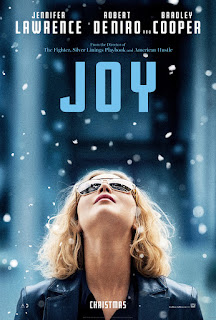It is testament to
Jennifer Lawrence's star power that she can be glorious whilst
selling mops. These mops, however, are not any ordinary household
cleaning implement: they are the 'Miracle Mops', invented by
real-life single mother Joy Mangano who made a fortune selling them
on the QVC shopping channel. Not the most compelling true story for
screenwriter Annie Mumolo and director David O. Russell to tackle,
but in Joy,
their efforts result in a strange combination of surreal drama, the
occasional laugh and fleeting moments of heartfelt emotion.
Joy is
not, of course, the first film which brings together Jennifer
Lawrence with David O. Russell. Nor is it, indeed, her first time
acting opposite Bradley Cooper and Robert De Niro (both starred
alongside her in Silver Linings Playbook).
Lawrence plays Joy, who is struggling to find happiness and
satisfaction in her life, largely as a result of her dysfunctional
family. Her invalid mother (Virginia Madsen) stays in bed all day
watching soap operas, whilst Joy's ex-husband (played by Édgar
Ramírez)
lives in the basement of her house. Her hapless divorced father (De
Niro, in the slightly eccentric paternal role in which he seems to be
typecast nowadays) returns to the domestic mix, also temporarily
moving in to the basement after splitting with his most recent
partner. Only Joy's grandmother Mimi (Diane Ladd) and best friend
Jackie (Dascha Polanco) seem to act as encouraging voices of sanity.
Compelled
to make more of her life and, in many ways, to disprove those
(including her parents) who said she should be content with banal
domesticity for the rest of her life, Joy invents a self-wringing mop
after a mishap with red wine and broken glass on her dad's latest
lover's yacht. This plot – a story of invention and self
re-invention – works well, leaving the audience satisfied as Joy
takes on the male-dominated corporate world and transforms her life.
But this fulfilment in narrative terms is eclipsed by the film's tone
which is, quite frankly, all over the place.
David
O. Russell's direction is as confused as it is full of ideas. The
dissatisfaction with life which Joy feels is established early on
through the bizarre behaviour of her family and much of the film's
beginning is punctuated with rather surreal sequences in which Joy
finds herself trapped in her mother's soap operas. By the film's end,
however, this rather kooky tone is lost as Lawrence struts down the
road after a successful business deal, sunglasses on and ready to
tackle the world of domestic cleaning.
The
screenplay is peppered with humorous moments but it doesn't develop
as a comedy – which it certainly could have done with Lawrence's
comedic flair. Neither is it, however, a straight-down-the-line
drama. Instead, the film floats about between reality and unreality,
playing with ideas but never fully-engaging with the emotions it
seeks to interrogate. Instead, it navigates its themes of family,
business and success without settling on what any of it actually
means. Joy's story, whilst transformative on a personal level, leaves
the rest of us a little disengaged with proceedings.
That
said, the performances are great: Bradley Cooper, as a QVC executive,
does well and Jennifer Lawrence is her usual brilliant self as she
attempts to anchor the film's disparate elements. Her face magnetises
the camera and allows the audience to empathise with her character's
situation, even if not with the film as a whole. But despite her star
power, the film feels too uneven to create emotional coherency with
its audience, something which it needs desperately, given that its
subject isn't the most exciting in the world.
Joy
has
individual scenes which are touching and emotionally-charged.
Lawrence is, as ever, fantastic, and there's certainly a message of
morality to be found. But I can't help feeling that audiences will
leave the cinema confused. Perhaps a repeat viewing is required, but
Joy is
far from the joyous New Year film which many will be expecting.
Clapperboard Rating: * * *


No comments:
Post a Comment